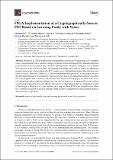FPGA Implementation of a Cryptographically-Secure PUF Based on Learning Parity with Noise
Author(s)
Jin, Chenglu; Nguyen, Phuong Ha; Fuller, Benjamin; van Dijk, Marten; Nguyen, Phuong; Herder, Charles Henry; Devadas, Srinivas; Ren, Ling; ... Show more Show less
Downloadcryptography-01-00023-v2.pdf (3.952Mb)
PUBLISHER_CC
Publisher with Creative Commons License
Creative Commons Attribution
Terms of use
Metadata
Show full item recordAbstract
Herder et al. (IEEE Transactions on Dependable and Secure Computing, 2017) designed a new computational fuzzy extractor and physical unclonable function (PUF) challenge-response protocol based on the Learning Parity with Noise (LPN) problem. The protocol requires no irreversible state updates on the PUFs for security, like burning irreversible fuses, and can correct for significant measurement noise when compared to PUFs using a conventional (information theoretical secure) fuzzy extractor. However, Herder et al. did not implement their protocol. In this paper, we give the first implementation of a challenge response protocol based on computational fuzzy extractors. Our main insight is that “confidence information” does not need to be kept private, if the noise vector is independent of the confidence information, e.g., the bits generated by ring oscillator pairs which are physically placed close to each other. This leads to a construction which is a simplified version of the design of Herder et al. (also building on a ring oscillator PUF). Our simplifications allow for a dramatic reduction in area by making a mild security assumption on ring oscillator physical obfuscated key output bits. Keywords: physical unclonable function; learning parity with noise; fuzzy extractor
Date issued
2017-12Department
Massachusetts Institute of Technology. Computer Science and Artificial Intelligence Laboratory; Massachusetts Institute of Technology. Department of Electrical Engineering and Computer ScienceJournal
Cryptography
Publisher
MDPI AG
Citation
Jin, Chenglu et al. "FPGA Implementation of a Cryptographically-Secure PUF Based on Learning Parity with Noise." Cryptography 1,3 (2017 December): 23 © 2017 The Author(s)
Version: Final published version
ISSN
2410-387X